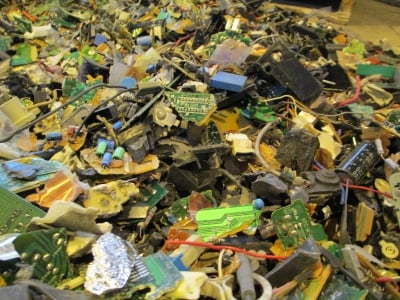The need for increased adoption of metal recovery from e-waste continues to gain greater urgency as the gap between supply and demand grows ever-wider in the pursuit of a clean-energy future.
Fortunately, The FEECO Innovation Center has the expertise and equipment needed to test the feasibility of metal recovery from various e-waste sources through the use of batch- and pilot-scale test rotary kilns.
Metal Recovery with a Rotary Kiln
Not surprisingly, rotary kilns have long been investigated for metal recovery applications; they allow producers to create a controlled processing environment, while operating on a continuous basis and providing reliable, high-capacity processing. They can accept a wide range of feedstock types and are incredibly customizable, so producers can tailor the device to their exact processing needs.
In the case of e-waste treatment, a rotary kiln works by employing high temperatures, paired with a controlled processing environment, to cause volatilization, leaving behind ash and metal, which can then be recovered for further refinement.
The rotary kiln may be either direct-fired or indirect-fired, depending on the needs of the material and the process objectives.
Testing Metal Recovery in the Innovation Center
Many producers are utilizing our state-of-the-art testing facility to not only confirm feasibility, but also to conduct additional process development and establish the data necessary for building commercial-scale rotary kilns.
The Innovation Center has batch- and pilot-scale options for both direct and indirect thermal processing. Testing establishes critical process data, including:
- Temperature profiles
- Retention time
- Processing atmosphere requirements
- Off-gas treatment requirements
- Volumetric flow
- Feed rate
The data gathered is then used to inform FEECO engineers in designing the commercial-scale equipment needed to carry out the process.
Nickel and Copper Recovery
The facility recently worked with a large natural resources company to reclaim nickel from old cell phone batteries, laptop batteries and other nickel-bearing wastes. The testing was successful and led to FEECO engineering and manufacturing a custom nickel recovery kiln.
Another company has been working with the facility to conduct feasibility test work around reclaiming copper from printed circuit boards (pcb) and other copper-bearing wastes.
Conclusion
Solving the mounting e-waste problem has become a primary focus of sustainability efforts and FEECO rotary kilns have proven to be an effective method of recovering the valuable metal components from e-waste. For more information on our custom rotary kilns or thermal testing capabilities, contact us today!

